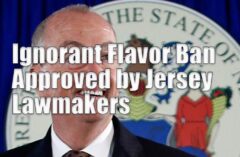Table of Contents
Last Updated on October 4, 2023 by Team Spinfuel
Boy, do Politicians love their taxes, our what?
I believe that’s all politicians love… money… and taxes is a surefire way to get it quickly. The newest attack on Vapers is this new FEDERAL e-cig tax. Taxes proposed so that the government can pay for anti-vaping programs in the nation’s schools. Sure, sure, that’s EXACTLY where it will go. Just ask any other industry that is taxed for the “greater good“, just what happened to that tax money….
Payoffs, Graft, Bribes, Oh My!
Bipartisan lawmakers (tax talk is always bipartisan) last Friday introduced a Bill that would tax e-cigarette companies and use the funds to pay for anti-vaping programs in schools. Do not believe that Taxes raised will ALL go to anti-vape campaigns will go to anti-vape campaigns. As the billions in cigarette tax money went toward educating the children against smoking every year. hint: It didn’t. It’s set to power agendas, nothing more. (Well, except for personal use by certain politicians I’m sure)
The e-Cig Tax
This tax, if passed, will how corrupt politicians will deal with not being able to Ban all vapes. That’s what they really want. Those that would return to smoking cigarettes would be paying a tax that has increased for decades.
Corrupt lawmakers estimate that the TAXES imposed on manufacturers and importers of electronic nicotine delivery systems would net $200 million a year. The tax is to be directed (yea, sure) to the CDC and FDA to create programs to attempt to prevent e-cigarette use at schools. Hmm… what about at home?
Just keep in mind, this one is a FEDERAL Tax. A federal tax, then state tax, city tax, and so on, until a bottle of non-flavored e-juice will cost you $80.
Basic eCig Tax Information gleaned from The Hill
The legislation requires the prevention programs to train school personnel to identify and better prevent youth vaping, conduct social media and marketing campaigns to educate students on health risks of e-cigarettes and provide resources to help treat youth nicotine addiction, among other things.
This bill also allows state and local health agencies and nonprofits to apply with the CDC for grants to carry out the prevention programs at middle and high schools.








